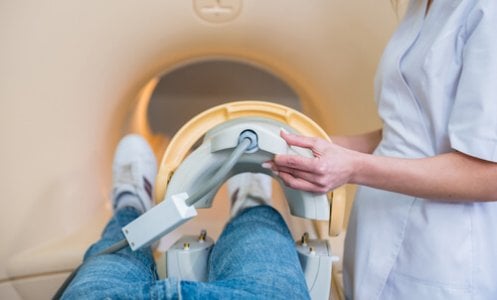Are ‘ageist’ Medicare MRI restrictions putting your health at risk?
- Replies 17
We here at the Seniors Discount Club have heard a lot of interesting and strange things while doing our research – but this one was particularly surprising and, unfortunately, disappointing.
It began around five years ago when the Medicare Taskforce Review recommended a new policy in the Turnbull government’s budget, claiming it would address the large increase in MRI costs from $16 million to $38 million.
From 1 November 2018, new restrictions were introduced to limit the ability of general practitioners (GPs) to request knee MRIs for patients 50 years and over.
The independent clinicians on the task force soon retracted their support for the measure, claiming 'there is no scientific literature cited to support [it]'.
The policy means Australians over 50 have to pay between $400-$600 for an urgent MRI, leaving those affected without the coverage they need or waiting for a specialist. It’s a situation that both doctors and seniors don’t agree with; peak bodies representing government task force committee members and advocates for our elderly community have each voiced their concerns.
The Australian Diagnostic Imaging Association, the Royal College of General Practitioners, the Royal Australian and New Zealand College of Radiologists and the Council on the Ageing all agree, that the policy is 'totally problematic'.
‘How is it fair, for example, that a 49-year-old who injures their knee playing sport would remain eligible for an MRI referred by their GP, while a 50-year-old suffering the same injury would first need to be referred to a specialist.’ said Lance Lawler, the President of the Royal Australian and New Zealand College of Radiologists at the time the policy was implemented.
‘This policy is effectively telling every Australian aged 50 and over, “hurt yourself trying to stay fit and you’ll be hurt in your wallet as well”.’ he continued.
At the Seniors Discount Club, we feel it’s necessary to keep these types of issues in the public discourse so that everyone is aware of the potential disparities in people’s access to medical care – and so that steps can be taken to ensure everyone is treated fairly, regardless of their age or income. We want to extend our thanks to member Cyndy S. for bringing this to our attention.
Unfortunately, member Cyndy S. was negatively impacted by this policy change: ‘Recently I needed to have an MRI of both knees and it cost me $690! Why is it that just when this type of diagnosis is needed, as we age and are often on a lower income, that Medicare decides to provide no rebate?’

And Cyndy isn’t the only SDC member to be impacted by this. Member @Pat T recently said, ‘I had to have a MRI on my replacement knee. It was cheaper for me to go back to the surgeon (he bulk billed) as a specialist can get it done on bulk billing whereas from a GP it is full cost.’
Even as far back as last year, another member, @Liz, ended up in a similar predicament: ‘I had a fall recently and only found out when sent to have a MRI, there is no rebate on knee MRI's if you are over 50 from Medicare. What aren't older people supposed to have any falls?’ they continued.
‘It is no wonder people are not getting treatment for injuries or rocking up to public hospitals and clogging an already crowded system. When sent to the Orthop I paid nearly $300 out of pocket to see him. Sometimes with older people it comes down to, do you feed yourself or do you pay the medical profession.’

We recommend all of our members – especially those over the age of 50 – to reach out to their local Member of Parliament to ask for better access to medical services. After all, your health and that of those around you is a priority for all of us!
Were you aware of these Medicare restrictions? Have they impacted you? Let us know in the comments section below.
It began around five years ago when the Medicare Taskforce Review recommended a new policy in the Turnbull government’s budget, claiming it would address the large increase in MRI costs from $16 million to $38 million.
From 1 November 2018, new restrictions were introduced to limit the ability of general practitioners (GPs) to request knee MRIs for patients 50 years and over.
The independent clinicians on the task force soon retracted their support for the measure, claiming 'there is no scientific literature cited to support [it]'.
The policy means Australians over 50 have to pay between $400-$600 for an urgent MRI, leaving those affected without the coverage they need or waiting for a specialist. It’s a situation that both doctors and seniors don’t agree with; peak bodies representing government task force committee members and advocates for our elderly community have each voiced their concerns.
The Australian Diagnostic Imaging Association, the Royal College of General Practitioners, the Royal Australian and New Zealand College of Radiologists and the Council on the Ageing all agree, that the policy is 'totally problematic'.
‘How is it fair, for example, that a 49-year-old who injures their knee playing sport would remain eligible for an MRI referred by their GP, while a 50-year-old suffering the same injury would first need to be referred to a specialist.’ said Lance Lawler, the President of the Royal Australian and New Zealand College of Radiologists at the time the policy was implemented.
‘This policy is effectively telling every Australian aged 50 and over, “hurt yourself trying to stay fit and you’ll be hurt in your wallet as well”.’ he continued.
At the Seniors Discount Club, we feel it’s necessary to keep these types of issues in the public discourse so that everyone is aware of the potential disparities in people’s access to medical care – and so that steps can be taken to ensure everyone is treated fairly, regardless of their age or income. We want to extend our thanks to member Cyndy S. for bringing this to our attention.
Unfortunately, member Cyndy S. was negatively impacted by this policy change: ‘Recently I needed to have an MRI of both knees and it cost me $690! Why is it that just when this type of diagnosis is needed, as we age and are often on a lower income, that Medicare decides to provide no rebate?’

These Medicare rebate changes are negatively impacting Australian seniors. Image Credit: Shutterstock
And Cyndy isn’t the only SDC member to be impacted by this. Member @Pat T recently said, ‘I had to have a MRI on my replacement knee. It was cheaper for me to go back to the surgeon (he bulk billed) as a specialist can get it done on bulk billing whereas from a GP it is full cost.’
Even as far back as last year, another member, @Liz, ended up in a similar predicament: ‘I had a fall recently and only found out when sent to have a MRI, there is no rebate on knee MRI's if you are over 50 from Medicare. What aren't older people supposed to have any falls?’ they continued.
‘It is no wonder people are not getting treatment for injuries or rocking up to public hospitals and clogging an already crowded system. When sent to the Orthop I paid nearly $300 out of pocket to see him. Sometimes with older people it comes down to, do you feed yourself or do you pay the medical profession.’
Key Takeaways
- In 2018, GPs were stripped of the ability to refer people aged over 50 for knee scans.
- The policy, which means older Australians have to pay between $400-$600 for an urgent MRI, was condemned by the Australian Diagnostic Imaging Association, the Royal College of General Practitioners, the Royal Australian and New Zealand College of Radiologists, and the Council on the Ageing.
Were you aware of these Medicare restrictions? Have they impacted you? Let us know in the comments section below.








